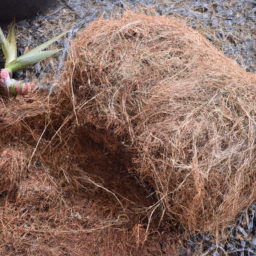How To Use Coconut Coir in Gardening
Table of Contents []
How To Use Coconut Coir In Gardening
How To Use Coconut Coir In Gardening
So you're looking to add something a little different to your gardening routine? Consider giving coco coir a try - coconut coir has recently been gaining attention as a great new way to add structure and nutrition to your soil. In this article, we'll dive into all the incredible benefits and use cases of coconut coir for gardening and get you set up with the best coco coir sources.
What is Coconut Coir?
Coconut coir is a natural fiber extracted from coconut husks used for a variety of purposes. It is a great option for gardening because of its properties coconut coir has exceptional water retention capacities due to its spongy properties, is biodegradable and resistant to fungi, and providing a natural structure for roots to thrive in.
Benefits of Coconut Coir
The unique characteristics of coconut coir make it a great addition to your garden. Here are some of the benefits you'll get when using coconut coir as an additive to your soil.
- Water Retention: Coconut coir can hold up to eight times its weight in water, meaning less time spent irrigating your garden and fewer water worries overall.
- Biodegradable: As a natural product, coconut coir breaks down over time and adds beneficial organic matter back into the soil.
- Root Structure: Because of its spongy properties, coconut coir encourages stronger root growth and development due to its ability to retain air providing a natural environment for roots to thrive in.
Pros and Cons
As with any product, coconut coir has its pros and cons. Here's a quick summary of what you can expect.
| Pros | Cons |
|---|---|
| Water retention | Replaces organic matter |
| Biodegradable | Packages not always eco-friendly |
| Root structure | Careful sourcing needed |
Case Studies
Research into coconut coir's effectiveness has been conducted in various parts of the world. Here are two examples.
Kerala, India
In Kerala, India, a research project was conducted to compare the effects of using coconut coir in a hydroponic coir-based system versus traditional soil-based farming. The results showed that using coconut coir as the medium for plants resulted in higher yields, lower water consumption, and healthier plants.
Singapore Green Roofing Initiative
In Singapore, researchers tested the effects of using coconut coir on the local environment compared to traditional green roofing options. The results showed that using coconut coir in green roofing projects resulted in higher climates of biodiversity, improved air quality, and lower energy costs.
FAQs
Before you start adding coconut coir to your gardening projects, here are some answers to your most common questions.
- Is coconut coir safe? Yes, coconut coir is perfectly safe for gardening and environment projects. It is non-toxic and biodegradable.
- Is it beneficial for soil health? Yes, coconut coir can be used to improve soil structure and increase water retention in soil.
- Is it difficult to source? coconut coir is readily available at most gardening stores, as well as in bulk from online sources.
Mistakes People Make
- Not reading labels: Make sure you read the label when buying coconut coir, as some brands add chemicals or salts that could negatively affect your plants.
- Using too much: coconut coir is great, but it doesn't need to make up your entire soil. Use small amounts to supplement your existing soil.
- Not properly mixing it: coconut coir is very dense when dry, so make sure to mix it with soil and compost before adding to your garden.
Best Practices
- Soak before using: coconut coir can absorb 8x its weight in water, so make sure it's soaked before adding to your soil.
- Consider your mix: Mix your coconut coir with soil and compost for the best results, and to provide the best nutrients for your plants.
- Let it decompose: As coconut coir breaks down, it will add more organic matter and nutrition to your soil.
Conclusion
As you can see, coconut coir is a great addition to your garden, providing unique benefits that traditional soil can't offer. With its exceptional water retention capacity, biodegradable properties, and supportive root structure, coconut coir can give you the edge you need to create the perfect garden. Just make sure you read the label and exercise caution, and you should see great results.
Final Notes
Whether you're looking to start a new gardening project or just want to give your existing garden a boost, coconut coir is a great option. Be sure to do your research on sourcing and read all the labels before use, and don't forget to let the coconut coir decompose over time to replenish the soil's organic matter. In the end, you'll be glad you gave your garden some TLC with the help of coconut coir!

Previous Page
Next Page
